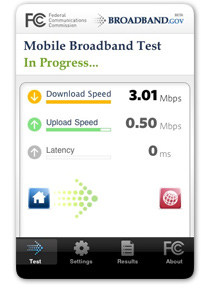 Are you getting the mobile broadband speeds your provider advertises for its whiz-bang 4G network? How do you know which carrier really delivers?
Are you getting the mobile broadband speeds your provider advertises for its whiz-bang 4G network? How do you know which carrier really delivers?
The Federal Communications Commission is hoping you can help them find out with a free Android app to be unveiled on Thursday.
The FCC has successfully used volunteer crowdsourcing before to keep wired Internet Service Providers honest through its “TestMyISP” speed measurement project for home broadband connections. When the first results were announced, an embarrassingly bad rating for Cablevision forced the cable company to quickly beef up its broadband infrastructure to match the speeds it promised customers.
Now the FCC’s new chairman Tom Wheeler hopes a similar effort will help the federal agency understand whether the promises wireless carriers make to customers are actually being kept.
With wireless broadband gaining in prominence, the FCC wants to do a better job monitoring a service most Americans use in some form while on-the-go. If providers like AT&T and Verizon Wireless are caught dramatically underperforming in coverage and speed, the agency may take that into account as part of its mission of regulatory oversight.
Consumers will also benefit from having an unbiased source that can offer regular analyses on the speed and performance of each carrier — useful information to have before being locked into a two-year contract.
Verizon, AT&T, T-Mobile, and Sprint are among the carriers agreeing to take part in the speed test project.
The FCC Speed Test app will initially be available for Android smartphones. There are no details about the release date of an Apple iOS version of the app, but the FCC’s Mobile Broadband Speed Test home page shows links (not yet active) for both versions of the app.


 Subscribe
Subscribe Set-top box-less Time Warner Cable subscribers in parts of New York City will find more than 90 percent of the basic cable lineup missing from their QAM-equipped televisions as the cable company completes a transition away from analog cable television and begins encrypting almost all its digital channels.
Set-top box-less Time Warner Cable subscribers in parts of New York City will find more than 90 percent of the basic cable lineup missing from their QAM-equipped televisions as the cable company completes a transition away from analog cable television and begins encrypting almost all its digital channels.


